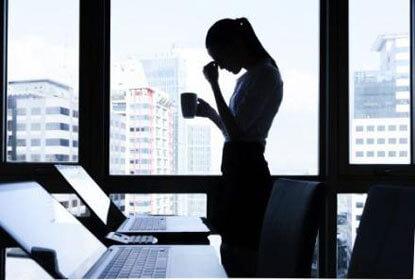
By definition, the condition of the profession is inextricably linked to the condition of the professionals within it. The status quo cannot remain intact very long when new thinking and tools are invited to the table. In my experience with my practice, this current crisis situation is encouraging more and more lawyers to look within to “get real” about the personal and professional lives they have created. This has further translated into a growing willingness to explore three critical practices that can be of assistance at this time: the practices of meditation, cultivating our intuition and leveraging energy healing. Let’s have a look at what this trifecta of tools has to offer, and how they can propel us forward in cultivating new insights in our respective situations.
Most people have heard of the term “meditation.” On the simplest level, it involves consciously tuning out external stimuli to rest the mind. It can occur in a variety of ways and/or formats. Some may simply choose to sit in silence focusing on their breathing, others may choose to spend time in nature, and still others may engage in any number of activities where the present moment is front and center. Should a more religious context resonate with you, it can be considered as a necessary counterpart to prayer—rather than actively communicating with your concept of a Higher Power, meditation would involve being more on the receiving end—as a listener. On a related notion, Professor Rhonda Magee of University of San Francisco School of Law has written extensively on the concept of “mindfulness meditation,” in the legal field as a means of assisting lawyers in being more deeply present and capable of choosing their responses to events that occur in their environments. She also feels that this practice would be extremely helpful for legal professionals who wish to be at the top of their game throughout their careers. [3] Think of how different your workday might be if you approached your professional obligations from a more relaxed mindset that was increasingly internally sharp & responsive as you committed to regular meditation practice. Arthur Ashe said it best when he said back in the day, “The ideal attitude is to be physically loose and mentally tight."
“Energy healing” is best understood as an umbrella term that encompasses a myriad of modalities that address imbalances and distortions in our non-physical energy systems to bring about health, harmony, and balance. The nature of modern-day life has many people thinking (and ultimately believing) that perpetual drama—at home, at work and everywhere in between—is par for the course. This author begs to differ. The extent to which one is experiencing such can very well be connected to the state of their energy field.
For context, let’s backtrack a bit here. Although these are largely beyond the view of the naked eye, every existing thing has an energy field—a ring of energy vibrating at a speed in correlation to the state of being of the person/thing in question. In many non-Western traditions, said energy fields are deemed to be invisible templates for our physical experience. To the extent that this is so, one can address physical, professional and/or emotional issues or challenges by examining the state of a person’s energy field. Patterns (behavioral or otherwise) —particularly when they are repeated and are non-responsive to our efforts to change things up—are clear indicators that one needs to look more deeply at the source of said patterning. Now while beyond the scope of this introductory article, there is a virtual army of practitioners who specialize in analyzing energy fields in addition to removing blockages that hinder or otherwise compromise your ability to live optimally.
Noted Brazilian author Paul Coelho said it best when he stated, “When you repeat a mistake, it is not a mistake anymore: it is a decision.” Make sure that the decisions you are making are in alignment with the highest and best for yourself, your clients and your life as a whole.
I have introduced a number of things here for you to think about—some which may be new to you, and others which you may not have considered adding to your problem—solving or life enrichment arsenal. Looking at new sources of information and new ways of thinking move us that much closer to creating improved results as far as our overall well-being in addition to crafting personal and professional lives that are reflective of our core values. Professor Magee also noted that as far as the practice of law is concerned, “clients are [best] served when their lawyers have a deeper set of resources for handling stress and dealing with conflict and uncertainty.” [2] The current state of the legal profession is very much in crisis, however, by leveraging a broader range of self-help tools, you can still decide in your own way not to participate.
- See Law School: The Most Depressing Three Years of Your Life for more information.
See the following articles for more information:
- 25 Reasons Most Attorneys Hate the Practice of Law and Go Crazy (and What to Do About it)
- Top 14 Ways Attorneys Can Avoid Burnout from the Stress of Practicing Law
[2] Sara Tollefson, Mindful Lawyering, Greater Good, https://greatergood.berkeley.edu/article/item/mindful_lawyering
[3] Rhonda Magee, Making the Case for Mindfulness and the Law, NW Lawyer, https://nwlawyer.wsba.org/nwlawyer/april_may_2014/?pg=9#pg20



